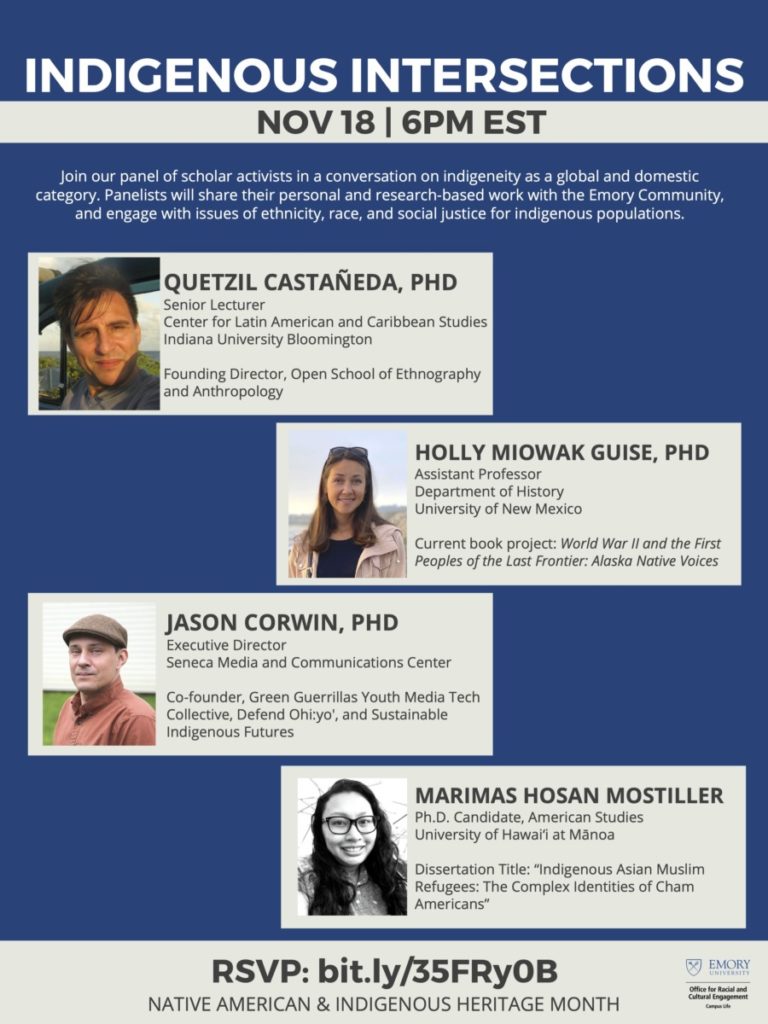(published October 12, 2020 in the Emory University Office of Equity, Diversity, and Inclusion Newsletter.)
Our/the Indigenous communities and their allies are standing in solidarity with the Black Lives Matter movement. It is important to recognize that this powerful uprising to dismantle systemic racism has supported Indigenous peoples’ struggles and visibility, and has signaled the crucial intertwined history of Indigenous land dispossession and the enslavement of Africans and African-descended peoples in the Americas. Some significant wins include initiatives to “unsettle” and “decolonize” the curriculum, the name change of the NFL DC football team, and the toppling of numerous monuments across the United States of America.
The second Monday of October recognizes the invaluable contributions made by Indigenous nations, peoples, and people. It acknowledges the people who are the first inhabitants of the land that is present-day U.S., and their enduring nations and peoples. Across the United States, numerous higher education institutions, over 100 cities and municipalities (including South Fulton county here in Georgia), and at least thirteen different states have declared the second Monday of October as an official holiday, Indigenous Peoples’ Day. We are deeply appreciative of the recent decision by Emory University President Fenves, Interim Provost Love, and the Emory leadership to officially recognize this day at our institution. In the United States, the movement to recognize Indigenous Peoples’ Day began in the late 1980s as a counter-celebration to Columbus Day. We also wish to highlight that shortly after this, the United Nations designated August 9th as the International Day of the World’s Indigenous Peoples.
Today, we wish to acknowledge that there are 574 Tribal Nations living side by side, or sharing land, with the United States. This represents over 6 million people. Emory University itself resides on land that was forcibly dispossessed by the US government from the Mvskoke/Muscogee Creek Nation in 1821, through the First Treaty of Indian Springs. Emory was founded in 1836, just fifteen years after this treaty, during a period of sustained oppression, land dispossession, and forced relocation of Mvskoke/Muscogee (Creek) and Ani’yunwi’ya (Cherokee) people from Georgia and the Southeast. The ultimate removals of over 60,000 Indigenous people from this region to the area of present-day Oklahoma occurred during the genocidal period known as the Trail of Tears (1830-1838). Approximately 25% of the forcibly displaced Indigenous people died in route.
Today, the present-day Muscogee (Creek) Nation in Oklahoma is the fourth largest tribal nation in the U.S. with over 86,000 citizens. In 2019, Muscogee citizen Joy Harjo was named the 29th poet laureate of the United States. Here at Emory University, Professor Craig Womack, who is also Muscogee, is an internationally acclaimed scholar in Native American literary studies and a talented musician. We owe an immense debt to the Mvskoke, Ani’yunwi’ya and other original peoples who have cared for and inhabited these lands, and to their descendants.
We want the important social justice momentum that is developing across our nation to extend to our campus and ensure that Indigenous voices and contributions are part of our intellectual practices every day, not just on October 12th. On this day we hope that the Emory community will join us in recognizing the resiliency and strength of Indigenous Peoples — and especially our Native students — in succeeding in an education system that was not designed for them, and one that they are working to decolonize for the enrichment and flourishing of us all.
We welcome the Emory University community to find more resources and statements here at https://scholarblogs.emory.edu/nae
Beth Michel, MPH
Tohono O’odham/Navajo/Hopi
Associate Dean
Office of Undergraduate Admission
Debra Vidali, PhD
USA, from occupied Haudenosaunee territory
Associate Professor
Department of Anthropology




